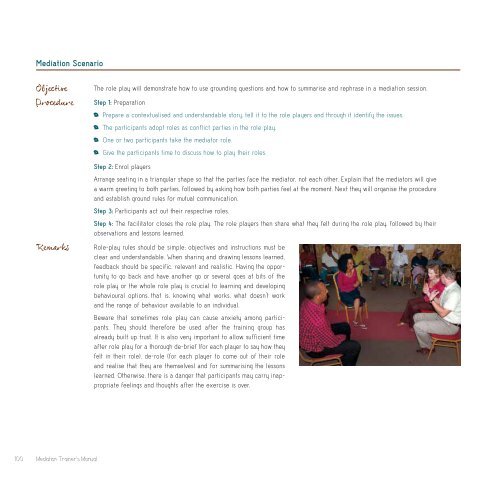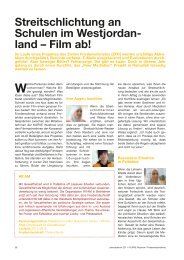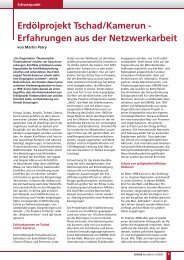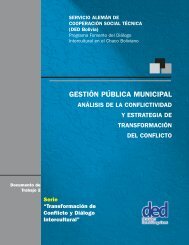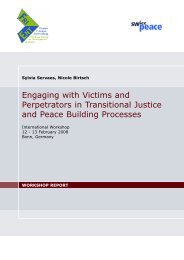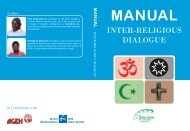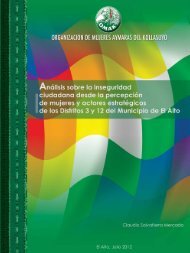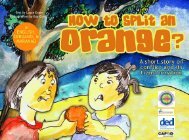<strong>Mediation</strong> ScenarioThe role play will demonstrate how to use grounding questions <strong>and</strong> how to summarise <strong>and</strong> rephrase in a mediation session.Step 1: Preparation> > Prepare a contextualised <strong>and</strong> underst<strong>and</strong>able story, tell it to the role players <strong>and</strong> through it identify the issues.> > The participants adopt roles as conflict parties in the role play.> > One or two participants take the mediator role.> > Give the participants time to discuss how to play their roles.Step 2: Enrol playersArrange seating in a triangular shape so that the parties face the mediator, not each other. Explain that the mediators will givea warm greeting to both parties, followed by asking how both parties feel at the moment. Next they will organise the procedure<strong>and</strong> establish ground rules for mutual communication.Step 3: Participants act out their respective roles.Step 4: The facilitator closes the role play. The role players then share what they felt during the role play, followed by theirobservations <strong>and</strong> lessons learned.Role-play rules should be simple; objectives <strong>and</strong> instructions must beclear <strong>and</strong> underst<strong>and</strong>able. When sharing <strong>and</strong> drawing lessons learned,feedback should be specific, relevant <strong>and</strong> realistic. Having the opportunityto go back <strong>and</strong> have another go or several goes at bits of therole play or the whole role play is crucial to learning <strong>and</strong> developingbehavioural options,—that is, knowing what works, what doesn't work<strong>and</strong> the range of behaviour available to an individual.Beware that sometimes role play can cause anxiety among participants.They should therefore be used after the training group hasalready built up trust. It is also very important to allow sufficient timeafter role play for a thorough de-brief (for each player to say how theyfelt in their role), de-role (for each player to come out of their role<strong>and</strong> realise that they are themselves) <strong>and</strong> for summarising the lessonslearned. Otherwise, there is a danger that participants may carry inappropriatefeelings <strong>and</strong> thoughts after the exercise is over.100 <strong>Mediation</strong> Trainer’s Manual
Iv.3Why <strong>and</strong> how to Give FeedbackFeedback is a vital part of training. It can be given in a formal or informal way. Feedback helps learners to maximise their potential at different stagesof training. It raises their awareness about strengths <strong>and</strong> areas for improvement, <strong>and</strong> identifies actions to take to improve performance. Learners valuefeedback, especially when it is given by someone credible whom they respect as a role model or for their knowledge, attitude <strong>and</strong> skills.Some important outcomes of giving feedback are:> > It improves the facilitator's future mode of delivery.> > It develops underst<strong>and</strong>ing <strong>and</strong> trust between thetraining participants <strong>and</strong> the trainer.> > It enhances learning.> > It allows the development of new ideas.> > It provides new experiences <strong>and</strong> improvements.Below are some suggestions on how you can give feedback in such away that it motivates your participants <strong>and</strong> supports them in developingknowledge, skills <strong>and</strong> behaviour appropriate to conflict transformation<strong>and</strong> mediation.> > Be aware that feedback can sometimes create misunderst<strong>and</strong>ingsdue to participants' diverse backgrounds. It can even createconflicts, especially when it is formulated poorly, expressed toonegatively, not well explained, off-topic, or offensive. Failing togive feedback, however, sends a nonverbal message in itself <strong>and</strong>can lead to a false assessment by the learner or lack of trust inthe group.> > It is difficult to hear feedback all the time. It is important that yougive feedback quickly after a role play, discussion, presentation,etc. To avoid interrupting a process, note down what you observe<strong>and</strong> give feedback later.> > How you give feedback depends on the context, but generallyyou should only give feedback when you are asked to, or uponacceptance of your offer. Feedback can be collected on aflipchart, a sheet of paper, or can be given verbally.Basic rules for giving feedback are:> > Give feedback as soon after the event as possible <strong>and</strong> by focusingon the positive.> > While giving feedback, be sensitive to the impact of your message.Consider the content of the message, the process of givingfeedback <strong>and</strong> the congruence between your verbal <strong>and</strong> nonverbalmessages. Thus as a trainer you should use: "I like this AND Ithink this can be improved",”instead of "I like this BUT this can beimproved" because the "but" tends to wipe out the positive part ina person's perception.> > Use open questions <strong>and</strong> techniques such as mirroring.> > Develop respect <strong>and</strong> trust with the learner.> > Be clear about what you are giving feedback on <strong>and</strong> link this tothe learner's overall professional development <strong>and</strong>/or intendedprogramme outcomes.> > Don't overload the participants.—Identify two or three key messagesthat you summarise at the end.> > Focus on behaviours that can be changed, not personality traits.> > Feedback needs to be given privately wherever possible, especiallynegative feedback.> > When giving negative feedback, suggest alternative behaviours.> > Describe specific behaviours, give examples where possible <strong>and</strong>do not evaluate or assume motives.Training Skills101


